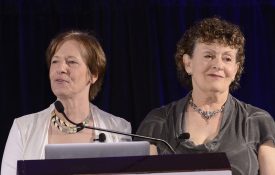-
Some Vowel Sounds Pack a Punch for Brands
When naming a company or a product, marketers may want to pay extra attention to the exact syllables they’re considering. New research demonstrates that specific sounds can convey an impressive amount of symbolic meaning, which Visit Page
-
Teaching Current Directions in Psychological Science
Aimed at integrating cutting-edge psychological science into the classroom, Teaching Current Directions in Psychological Science offers advice and how-to guidance about teaching a particular area of research or topic in psychological science that has been Visit Page
-

Louder Than Words
From facial cues to physical stances, our nonverbal expressions speak volumes to others. APS Fellows Klaus Scherer and Beatrice de Gelder and other researchers share the latest science on communication in the absence of speech. Visit Page
-
Speaking Two Languages for the Price of One
In everyday conversation, bilingual speakers often switch between languages mid-sentence with apparent ease, despite the fact that many studies suggest that language-switching should slow them down. New research suggests that consistency may allow bilingual speakers Visit Page
-
It’s A Small World When It Comes To :-/
NPR: Body language can be a dead giveaway of where you’re from. People can tell whether you’re from Australia or the U.K. by the way you smile. They can tell whether you’re from China or Visit Page
-

Making Science ‘Edible’
Today, parents wanting the best for their children’s intellectual development can turn to a number of “educational” digital apps, a variety of “brain-based” teaching strategies and curricula, and a never-ending stream of videos, toys, games Visit Page

